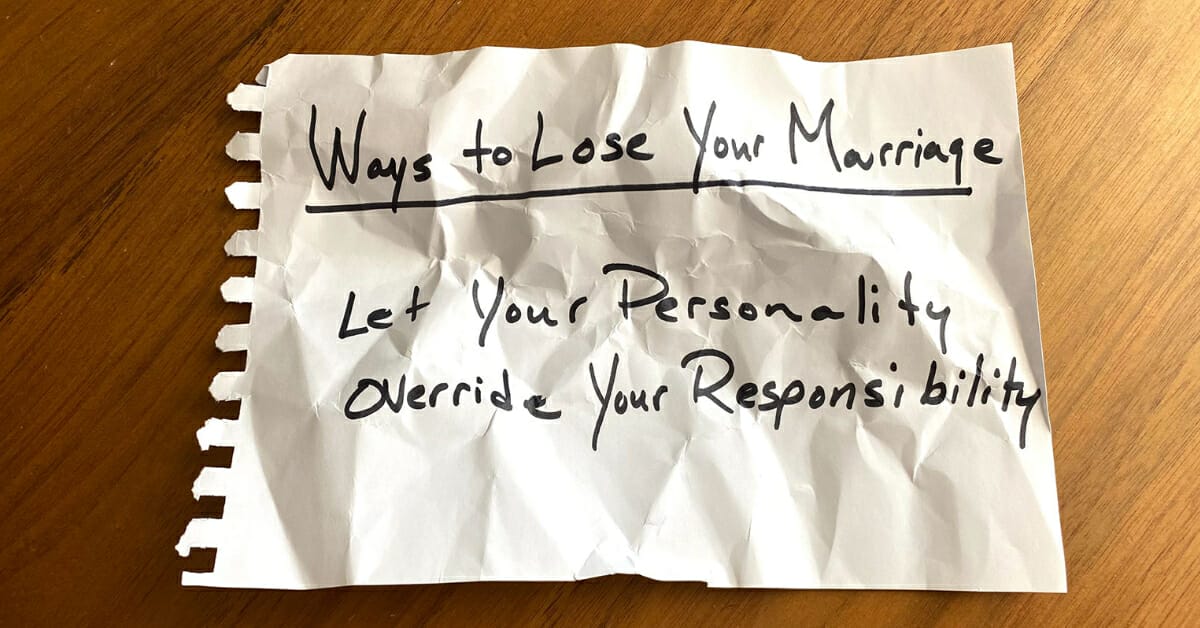Note: We are currently in a series called “The List.” The list refers to a list of ways you can lose your marriage and is based on information gleaned from over 20 years of counseling records and marriage failures.
Has there ever been a time when your spouse was wanting you to change in some way and you thought, “This is just the way I am. You knew this when you married me.”?
The question is…does your inherent personality relieve you of a responsibility to change?
PERSONALITY DIFFERENCES
There is no doubt that spouses can have different personalities. Personality differences between spouses are common…
- One spouse can be an introvert, while the other’s an extrovert.
- One spouse can pay attention to details, while the other ignores the details.
- One spouse can be a saver, while the other is a spender.
- One spouse can be very cautious, while the other is full-steam-ahead.
- One spouse can be quiet and reserved, while the other is boisterous and fun-loving.
It’s all a part of marriage.
PERSONALITY POSITIVES
Now, there’s nothing wrong with such personality differences. In fact, personality differences serve three purposes in a relationship:
- They draw us together. – Many couples feel they were attracted to one another because they were so much alike. But actually, it’s our differences, more than our similarities, that attract us to one another. When we’re dating, those differences feel refreshing and add spice to the relationship.
- They round us out. – Because our spouse is different than us, they help to provide what is lacking in our personality. Introverts need extroverts to get them out of their cave, while extroverts need introverts to help them learn how to be still and content with themselves. Spenders need savers. The cautious need the bold. Detail people need broad brush stroke people. You get the picture. Our personality differences help to round out the relationship.
- They grow us up. – Our spouse’s differences force us to approach things differently. An organized spouse can help a disorganized spouse learn to better organize their life. A spender can help a penny-pincher learn they can loosen their grip on money without being irresponsible. Our spouse’s personality serves as a tool to grow us in ways we might be deficient.
PERSONALITY PROBLEMS
But it’s this last reason that can aggravate us. Typically, we don’t want to change. It’s too much effort. Besides, we think we’re fine the way we are. So we say something like: “This is just the way I am. You knew this when you married me.” But, there are two problems with these statements…
Just because you were this way when you were dating doesn’t mean you were showing it.
When we’re dating, we tend to show our best selves. We try hard to be what we think the other will like and want. Consequently, we reign in the parts of ourselves we feel might be undesirable.
But after we’re married, we stop trying so hard. We relax, and more of our true self begins to leak out. Consequently, as our spouse starts to see this, they try to get us to go back to the way we use to be. When that doesn’t happen, our spouse feels like they’ve experienced a bait-and-switch in the relationship and they get frustrated with us.
Just because this is the way you are doesn’t mean you should stay that way.
The statement, “This is just the way I am” confuses a right to be who you are with a responsibility to change for your spouse.
If our children were being unkind or unhelpful we would not let them get away with it because “it’s just the way they are.” We would fully expect them to tweak and change who they are and grow into something better. The same should be true for us as spouses.
PERSONALITY ADJUSTMENTS
It’s true that we all have a personality that is God-given, genetically based, and family influenced. And at its core, that personality will be fairly fixed. But, that doesn’t mean you have to be a slave to that personality. Just because you have a certain personality bent doesn’t mean that personality can’t be bent in a different direction. Everyone can make changes in who they are and how they act. It’s failing to do so that increases the odds of losing your marriage.
So the question is…how can you keep your personality from overriding your responsibility to love your spouse…and still be you?
Elevate their needs.
If you want to keep your personality from overriding your responsibility to love your spouse, elevate their needs ahead of yours. Note: I didn’t say in place of your needs. Your needs are important also. Just treat theirs as a little more important.
Some are afraid that if they do this, their spouse will take advantage of them. That is a possibility. But more often than not, your spouse will feel so special by you putting them first, they will want to make sure your needs are met also.
Subjugate your rights.
We each have rights in marriage. But too often, we spend more time fighting for our rights than we do fighting for our spouse’s rights. It is only when we sacrificially subjugate our rights for the sake of our spouse’s rights that we understand and demonstrate true and deep love.
But…I’m not suggesting you need to be a doormat. Nor am I suggesting that you have no rights in the marriage and your spouse can treat you however they want to. A marriage that is abusive, dismissive, and demeaning should never be tolerated.
Redefine a win.
In times of conflicting wants and needs, spouses tend to act like they’re on opposing teams and they easily fall into a win/lose mindset, where either their spouse wins and they lose or they win and their spouse loses.
Don’t forget that you and your spouse are on the same team. If you can facilitate a win for your spouse, you win also. The team wins! Is this always possible? No. But it’s more possible than you think. So help your spouse win and you will win in the process.
A FINAL THOUGHT…
All of this is summarized in the words of the New Testament from Philippians chapter 2, verses 3-4…
Do nothing from selfish ambition or conceit, but in humility count others more significant than yourselves. Let each of you look not only to his own interests but also to the interests of others. (Philippians 2:3-4 ESV)
Did you hear it? “Look not only to his own interests, but also to the interests of others.” It’s a “both/and” approach. This is extremely important because if you let your personality override your responsibility to love your spouse, you stand a chance of losing your marriage. It’s one of the things “on the list.”






